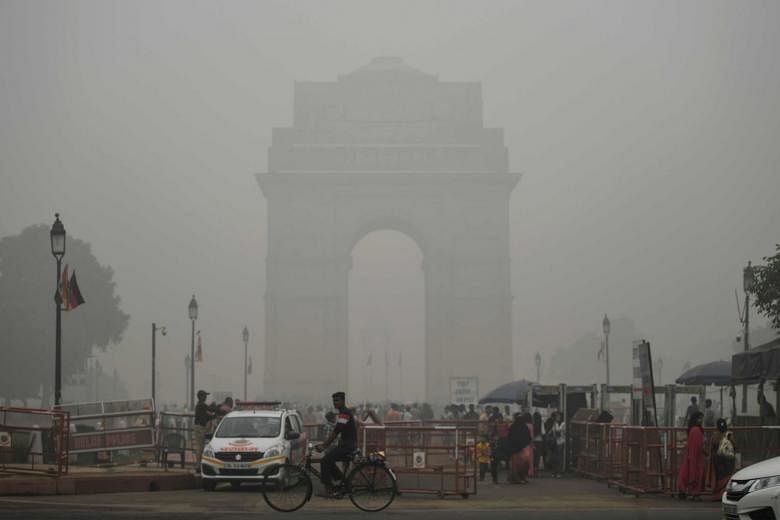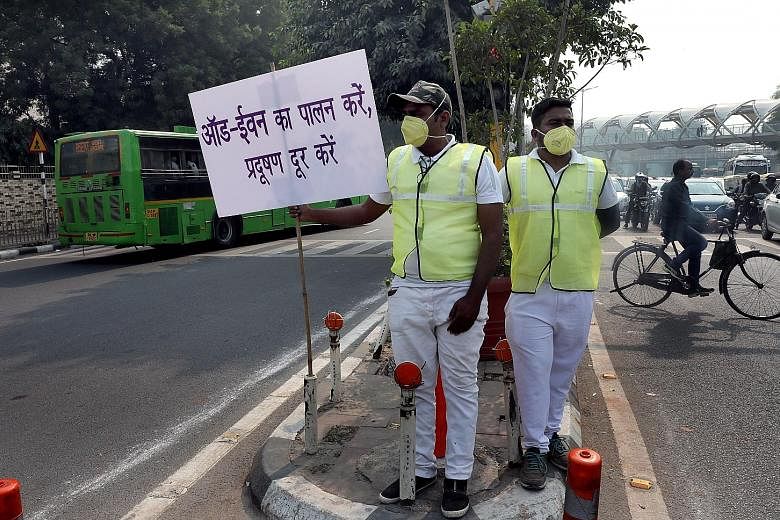Delhi and its adjoining areas continued to battle high pollution levels in a situation the Supreme Court called "atrocious" as it pulled up state authorities for failing to tackle the problem effectively.
Schools remained shut yesterday, with the authorities advising people to stay indoors, while fewer cars were seen on the roads under a new car-rationing scheme in which cars with odd-number plates may be driven on odd-numbered days and even-number plates on even-numbered days. The scheme will remain till Nov 15.
Amid doubts, including from the Supreme Court, about the scheme's effectiveness, Delhi Deputy Chief Minister Manish Sisodia said at a press conference that there had been a high degree of cooperation from Delhi residents.
Pollution was at hazardous levels yesterday but by the evening had come down to unhealthy, according to the Delhi Air Quality Index, while visibility improved marginally over Sunday.
Every year, pollution worsens after Deepavali, the Indian festival of lights, when firecrackers are set off as part of the celebrations.
The festival also coincides with farmers burning stubble to prepare their land for the next crop, adding to an already existing cocktail of pollutants from millions of vehicles, open burning of waste, constant construction activity and polluting industries in the vicinity of Delhi.
The Supreme Court, which is hearing petitions filed on the problem, expressed frustration with the annual pollution, echoing the sentiments of people across the capital city. It criticised the federal and state governments for lack of coordination and passing the buck.
"Can we survive in this atmosphere? This is not the way we can survive. No one is safe even inside homes; it is atrocious," said the Supreme Court Bench, headed by Justice Arun Mishra, according to reports in the Indian media.
Just a day earlier, Delhi Chief Minister Arvind Kejriwal, who suffers from breathing problems, said pollution had reached "unbearable levels" in northern India.
Delhi, which tops pollution lists worldwide, has more than 18 million people and more than 10 million vehicles. Poor public transport means many prefer to brave traffic jams.
Pollution levels have doubled over the last decade even as state and federal governments have taken a raft of measures over the last decade, including shutting down polluting power plants.
Residents continued to complain of health problems even as political parties engaged in wrangling over who was to blame for the situation.
"My eyes were burning tremendously. In the office, a number of people have fallen ill. But it's good to see Delhi residents following odd and even rules," said Ms Ritu Sharma, 54, who is in the travel industry. She blamed the pollution on stubble burning.
Environmentalists said tough decisions needed to be taken for better air quality even as questions were raised about the limits of car rationing.
"We now need transformative changes such as clean fuel and technology. Dirty industrial fuel burning has to be eliminated, which is a huge energy transition," said Ms Anumita Roychowdhury, executive director of the Centre for Science and Environment.
She said that ideally, 80 per cent of the population should be using public transport, but that requires better road infrastructure and last-mile connectivity.
"We have to understand that disruption is inconvenient. We have to support tough decisions and take accountability from government and act on it," she added.


